Foundations of Communication and Counselling: Interview Responses
VerifiedAdded on 2020/01/07
|8
|1733
|156
Homework Assignment
AI Summary
This document presents a set of interview questions and answers related to the foundations of communication and counselling. The content covers various aspects of a practitioner's role, including self-awareness, communication skills, and the importance of building effective therapeutic relationships. The responses highlight the significance of empathy, active listening, and self-reflection in professional practice. Strategies for self-care, mindfulness, and ongoing professional development are also discussed, providing valuable insights for aspiring and current practitioners. The document is structured around two sets of interview questions, offering a comprehensive overview of key concepts and practical applications within the field of counselling and communication.
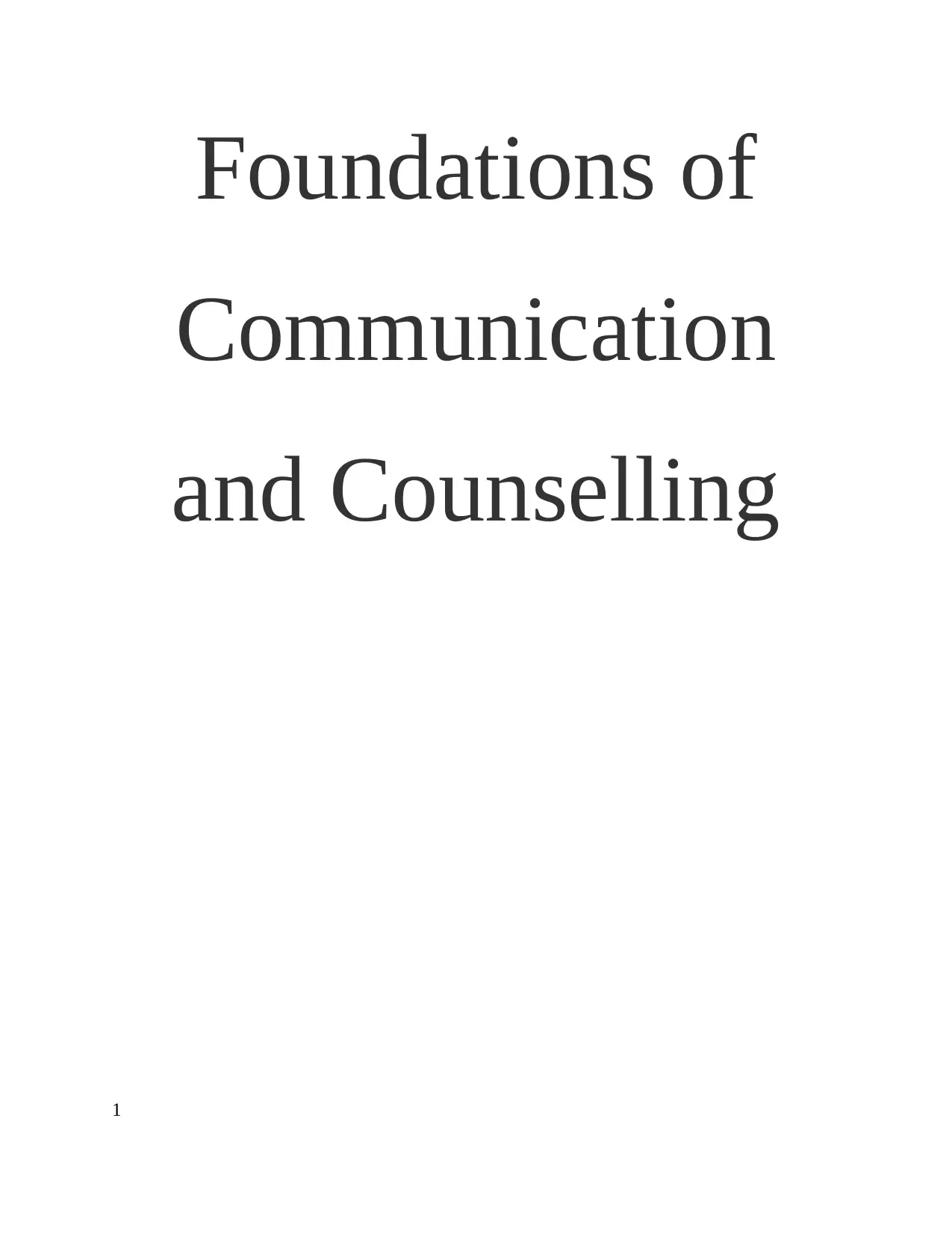
Foundations of
Communication
and Counselling
1
Communication
and Counselling
1
Paraphrase This Document
Need a fresh take? Get an instant paraphrase of this document with our AI Paraphraser
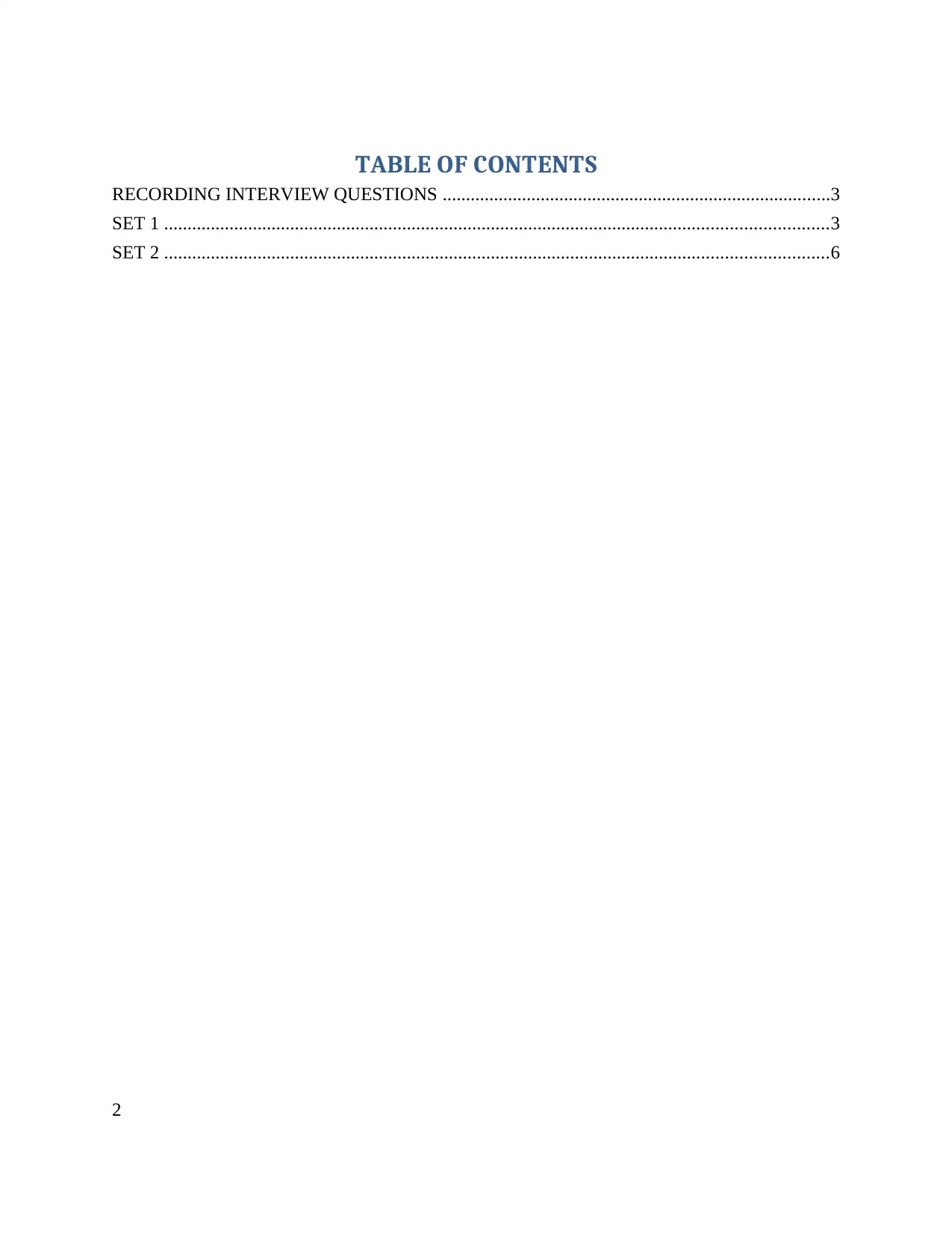
TABLE OF CONTENTS
RECORDING INTERVIEW QUESTIONS ...................................................................................3
SET 1 ..............................................................................................................................................3
SET 2 ..............................................................................................................................................6
2
RECORDING INTERVIEW QUESTIONS ...................................................................................3
SET 1 ..............................................................................................................................................3
SET 2 ..............................................................................................................................................6
2
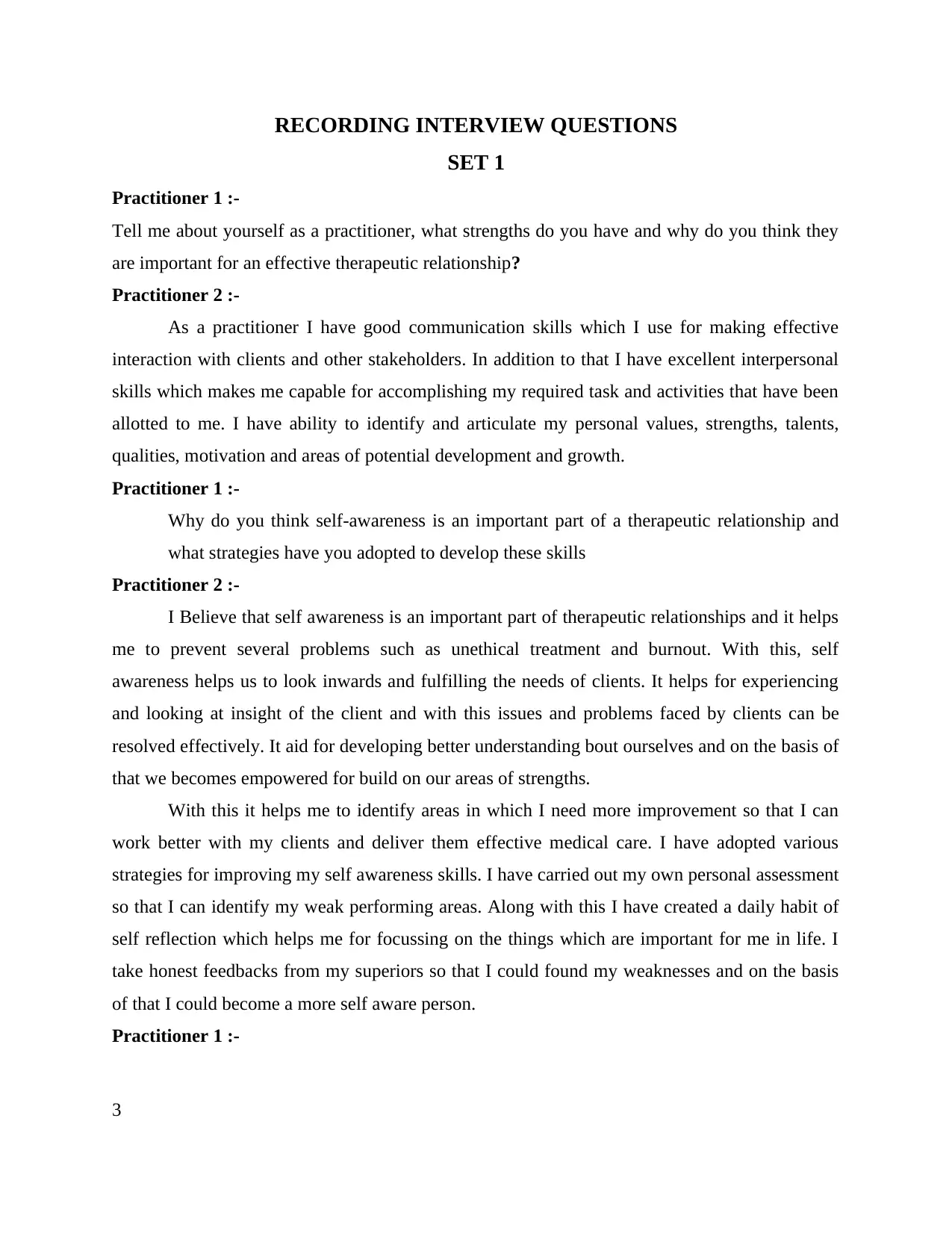
RECORDING INTERVIEW QUESTIONS
SET 1
Practitioner 1 :-
Tell me about yourself as a practitioner, what strengths do you have and why do you think they
are important for an effective therapeutic relationship?
Practitioner 2 :-
As a practitioner I have good communication skills which I use for making effective
interaction with clients and other stakeholders. In addition to that I have excellent interpersonal
skills which makes me capable for accomplishing my required task and activities that have been
allotted to me. I have ability to identify and articulate my personal values, strengths, talents,
qualities, motivation and areas of potential development and growth.
Practitioner 1 :-
Why do you think self-awareness is an important part of a therapeutic relationship and
what strategies have you adopted to develop these skills
Practitioner 2 :-
I Believe that self awareness is an important part of therapeutic relationships and it helps
me to prevent several problems such as unethical treatment and burnout. With this, self
awareness helps us to look inwards and fulfilling the needs of clients. It helps for experiencing
and looking at insight of the client and with this issues and problems faced by clients can be
resolved effectively. It aid for developing better understanding bout ourselves and on the basis of
that we becomes empowered for build on our areas of strengths.
With this it helps me to identify areas in which I need more improvement so that I can
work better with my clients and deliver them effective medical care. I have adopted various
strategies for improving my self awareness skills. I have carried out my own personal assessment
so that I can identify my weak performing areas. Along with this I have created a daily habit of
self reflection which helps me for focussing on the things which are important for me in life. I
take honest feedbacks from my superiors so that I could found my weaknesses and on the basis
of that I could become a more self aware person.
Practitioner 1 :-
3
SET 1
Practitioner 1 :-
Tell me about yourself as a practitioner, what strengths do you have and why do you think they
are important for an effective therapeutic relationship?
Practitioner 2 :-
As a practitioner I have good communication skills which I use for making effective
interaction with clients and other stakeholders. In addition to that I have excellent interpersonal
skills which makes me capable for accomplishing my required task and activities that have been
allotted to me. I have ability to identify and articulate my personal values, strengths, talents,
qualities, motivation and areas of potential development and growth.
Practitioner 1 :-
Why do you think self-awareness is an important part of a therapeutic relationship and
what strategies have you adopted to develop these skills
Practitioner 2 :-
I Believe that self awareness is an important part of therapeutic relationships and it helps
me to prevent several problems such as unethical treatment and burnout. With this, self
awareness helps us to look inwards and fulfilling the needs of clients. It helps for experiencing
and looking at insight of the client and with this issues and problems faced by clients can be
resolved effectively. It aid for developing better understanding bout ourselves and on the basis of
that we becomes empowered for build on our areas of strengths.
With this it helps me to identify areas in which I need more improvement so that I can
work better with my clients and deliver them effective medical care. I have adopted various
strategies for improving my self awareness skills. I have carried out my own personal assessment
so that I can identify my weak performing areas. Along with this I have created a daily habit of
self reflection which helps me for focussing on the things which are important for me in life. I
take honest feedbacks from my superiors so that I could found my weaknesses and on the basis
of that I could become a more self aware person.
Practitioner 1 :-
3
⊘ This is a preview!⊘
Do you want full access?
Subscribe today to unlock all pages.

Trusted by 1+ million students worldwide
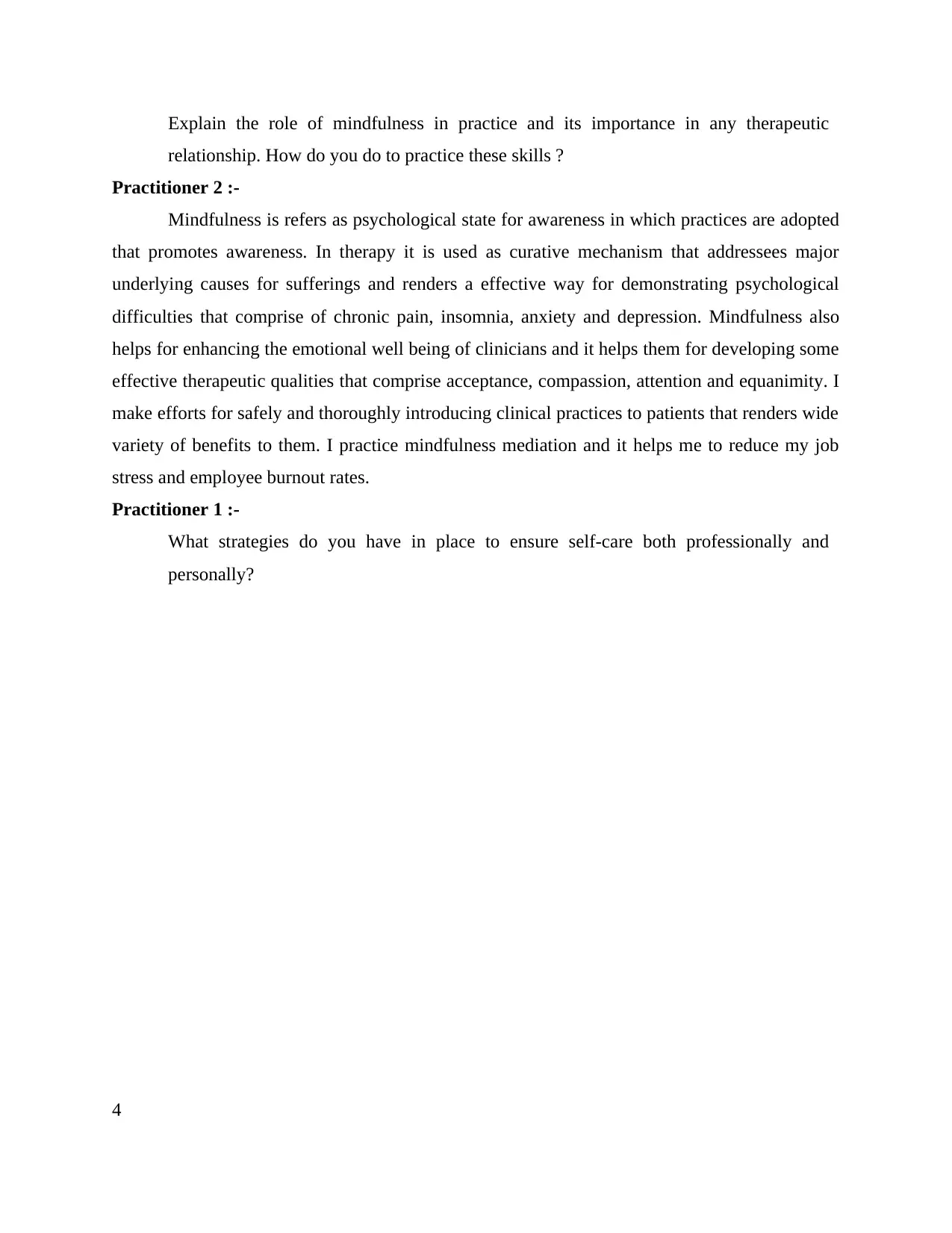
Explain the role of mindfulness in practice and its importance in any therapeutic
relationship. How do you do to practice these skills ?
Practitioner 2 :-
Mindfulness is refers as psychological state for awareness in which practices are adopted
that promotes awareness. In therapy it is used as curative mechanism that addressees major
underlying causes for sufferings and renders a effective way for demonstrating psychological
difficulties that comprise of chronic pain, insomnia, anxiety and depression. Mindfulness also
helps for enhancing the emotional well being of clinicians and it helps them for developing some
effective therapeutic qualities that comprise acceptance, compassion, attention and equanimity. I
make efforts for safely and thoroughly introducing clinical practices to patients that renders wide
variety of benefits to them. I practice mindfulness mediation and it helps me to reduce my job
stress and employee burnout rates.
Practitioner 1 :-
What strategies do you have in place to ensure self-care both professionally and
personally?
4
relationship. How do you do to practice these skills ?
Practitioner 2 :-
Mindfulness is refers as psychological state for awareness in which practices are adopted
that promotes awareness. In therapy it is used as curative mechanism that addressees major
underlying causes for sufferings and renders a effective way for demonstrating psychological
difficulties that comprise of chronic pain, insomnia, anxiety and depression. Mindfulness also
helps for enhancing the emotional well being of clinicians and it helps them for developing some
effective therapeutic qualities that comprise acceptance, compassion, attention and equanimity. I
make efforts for safely and thoroughly introducing clinical practices to patients that renders wide
variety of benefits to them. I practice mindfulness mediation and it helps me to reduce my job
stress and employee burnout rates.
Practitioner 1 :-
What strategies do you have in place to ensure self-care both professionally and
personally?
4
Paraphrase This Document
Need a fresh take? Get an instant paraphrase of this document with our AI Paraphraser
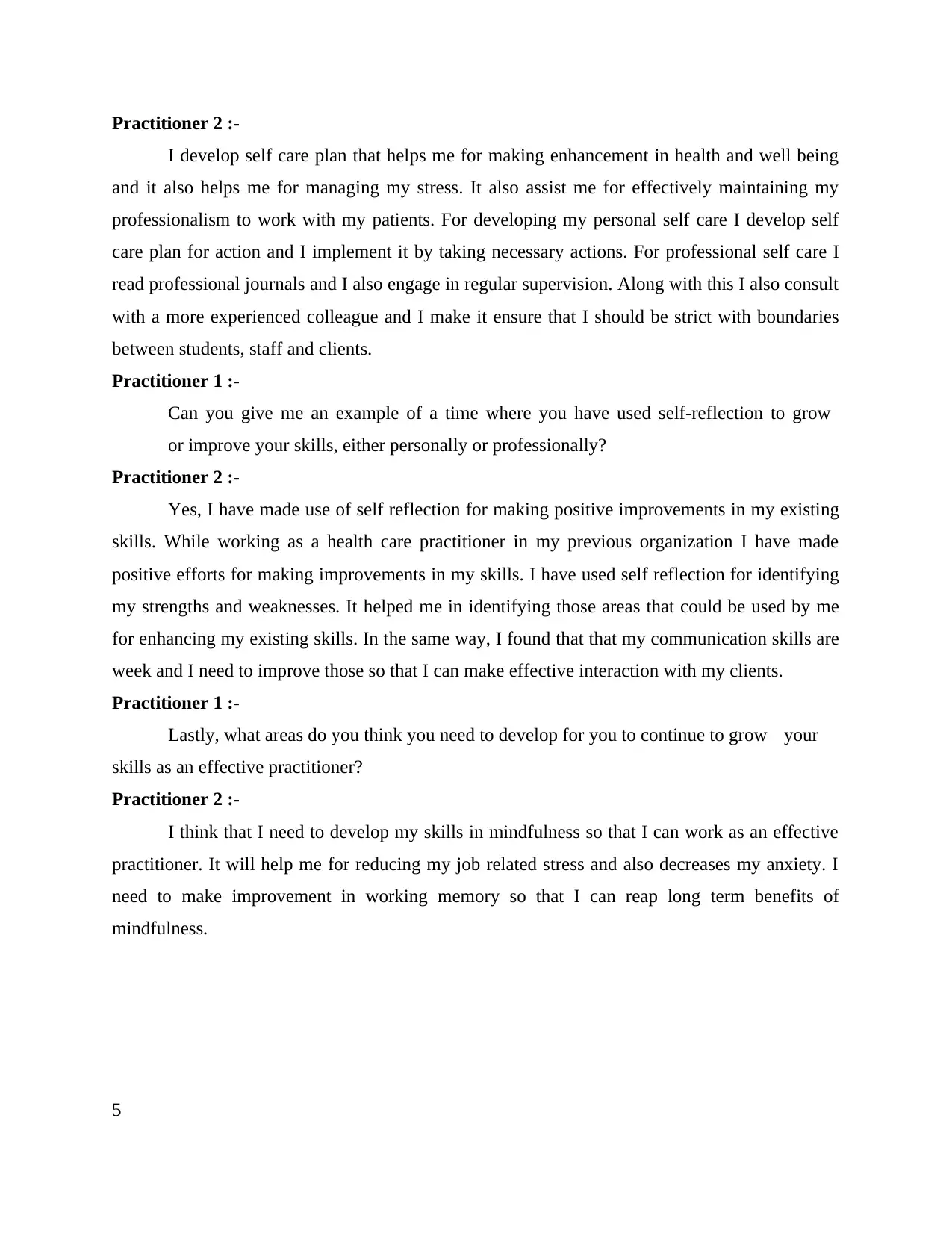
Practitioner 2 :-
I develop self care plan that helps me for making enhancement in health and well being
and it also helps me for managing my stress. It also assist me for effectively maintaining my
professionalism to work with my patients. For developing my personal self care I develop self
care plan for action and I implement it by taking necessary actions. For professional self care I
read professional journals and I also engage in regular supervision. Along with this I also consult
with a more experienced colleague and I make it ensure that I should be strict with boundaries
between students, staff and clients.
Practitioner 1 :-
Can you give me an example of a time where you have used self-reflection to grow
or improve your skills, either personally or professionally?
Practitioner 2 :-
Yes, I have made use of self reflection for making positive improvements in my existing
skills. While working as a health care practitioner in my previous organization I have made
positive efforts for making improvements in my skills. I have used self reflection for identifying
my strengths and weaknesses. It helped me in identifying those areas that could be used by me
for enhancing my existing skills. In the same way, I found that that my communication skills are
week and I need to improve those so that I can make effective interaction with my clients.
Practitioner 1 :-
Lastly, what areas do you think you need to develop for you to continue to grow your
skills as an effective practitioner?
Practitioner 2 :-
I think that I need to develop my skills in mindfulness so that I can work as an effective
practitioner. It will help me for reducing my job related stress and also decreases my anxiety. I
need to make improvement in working memory so that I can reap long term benefits of
mindfulness.
5
I develop self care plan that helps me for making enhancement in health and well being
and it also helps me for managing my stress. It also assist me for effectively maintaining my
professionalism to work with my patients. For developing my personal self care I develop self
care plan for action and I implement it by taking necessary actions. For professional self care I
read professional journals and I also engage in regular supervision. Along with this I also consult
with a more experienced colleague and I make it ensure that I should be strict with boundaries
between students, staff and clients.
Practitioner 1 :-
Can you give me an example of a time where you have used self-reflection to grow
or improve your skills, either personally or professionally?
Practitioner 2 :-
Yes, I have made use of self reflection for making positive improvements in my existing
skills. While working as a health care practitioner in my previous organization I have made
positive efforts for making improvements in my skills. I have used self reflection for identifying
my strengths and weaknesses. It helped me in identifying those areas that could be used by me
for enhancing my existing skills. In the same way, I found that that my communication skills are
week and I need to improve those so that I can make effective interaction with my clients.
Practitioner 1 :-
Lastly, what areas do you think you need to develop for you to continue to grow your
skills as an effective practitioner?
Practitioner 2 :-
I think that I need to develop my skills in mindfulness so that I can work as an effective
practitioner. It will help me for reducing my job related stress and also decreases my anxiety. I
need to make improvement in working memory so that I can reap long term benefits of
mindfulness.
5
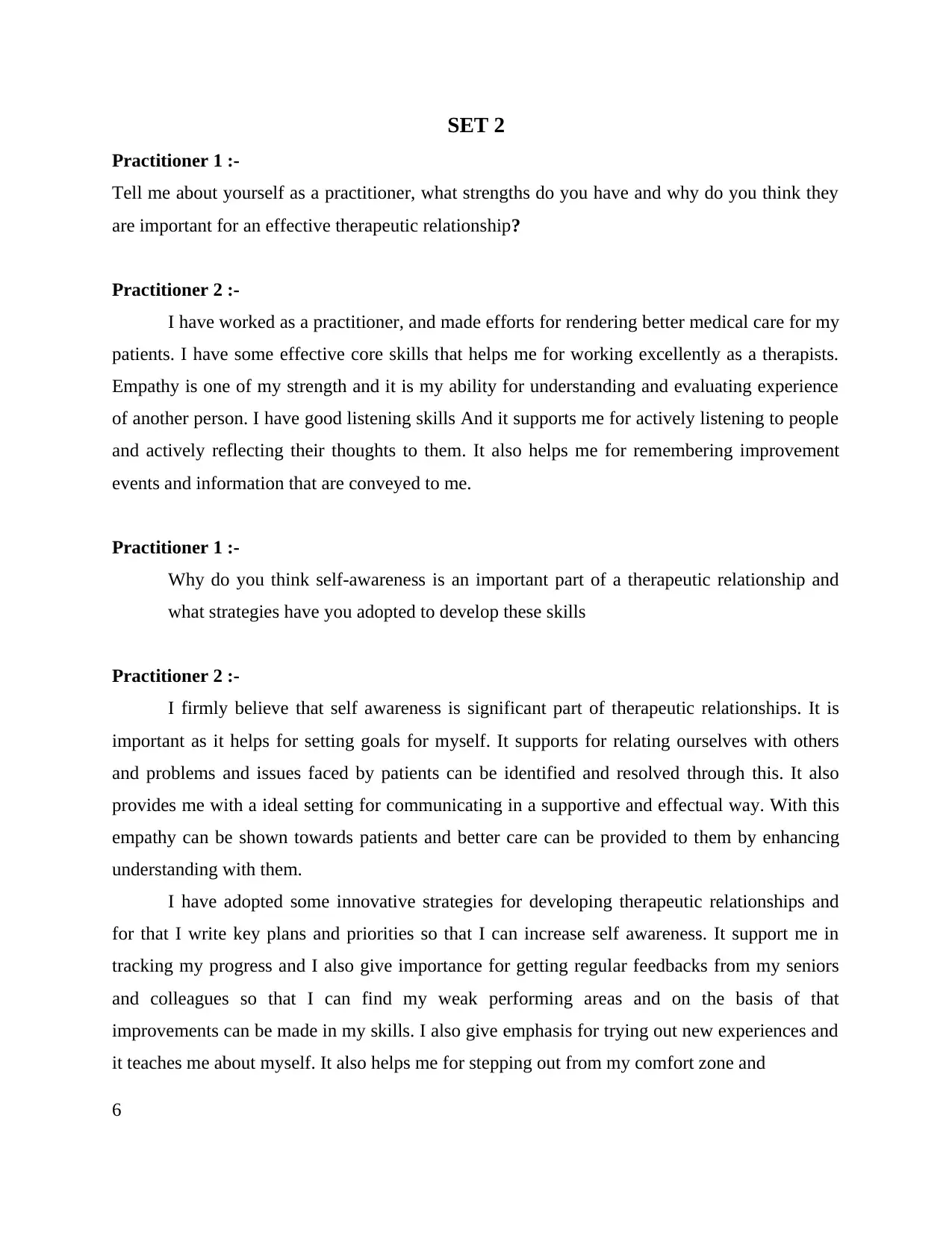
SET 2
Practitioner 1 :-
Tell me about yourself as a practitioner, what strengths do you have and why do you think they
are important for an effective therapeutic relationship?
Practitioner 2 :-
I have worked as a practitioner, and made efforts for rendering better medical care for my
patients. I have some effective core skills that helps me for working excellently as a therapists.
Empathy is one of my strength and it is my ability for understanding and evaluating experience
of another person. I have good listening skills And it supports me for actively listening to people
and actively reflecting their thoughts to them. It also helps me for remembering improvement
events and information that are conveyed to me.
Practitioner 1 :-
Why do you think self-awareness is an important part of a therapeutic relationship and
what strategies have you adopted to develop these skills
Practitioner 2 :-
I firmly believe that self awareness is significant part of therapeutic relationships. It is
important as it helps for setting goals for myself. It supports for relating ourselves with others
and problems and issues faced by patients can be identified and resolved through this. It also
provides me with a ideal setting for communicating in a supportive and effectual way. With this
empathy can be shown towards patients and better care can be provided to them by enhancing
understanding with them.
I have adopted some innovative strategies for developing therapeutic relationships and
for that I write key plans and priorities so that I can increase self awareness. It support me in
tracking my progress and I also give importance for getting regular feedbacks from my seniors
and colleagues so that I can find my weak performing areas and on the basis of that
improvements can be made in my skills. I also give emphasis for trying out new experiences and
it teaches me about myself. It also helps me for stepping out from my comfort zone and
6
Practitioner 1 :-
Tell me about yourself as a practitioner, what strengths do you have and why do you think they
are important for an effective therapeutic relationship?
Practitioner 2 :-
I have worked as a practitioner, and made efforts for rendering better medical care for my
patients. I have some effective core skills that helps me for working excellently as a therapists.
Empathy is one of my strength and it is my ability for understanding and evaluating experience
of another person. I have good listening skills And it supports me for actively listening to people
and actively reflecting their thoughts to them. It also helps me for remembering improvement
events and information that are conveyed to me.
Practitioner 1 :-
Why do you think self-awareness is an important part of a therapeutic relationship and
what strategies have you adopted to develop these skills
Practitioner 2 :-
I firmly believe that self awareness is significant part of therapeutic relationships. It is
important as it helps for setting goals for myself. It supports for relating ourselves with others
and problems and issues faced by patients can be identified and resolved through this. It also
provides me with a ideal setting for communicating in a supportive and effectual way. With this
empathy can be shown towards patients and better care can be provided to them by enhancing
understanding with them.
I have adopted some innovative strategies for developing therapeutic relationships and
for that I write key plans and priorities so that I can increase self awareness. It support me in
tracking my progress and I also give importance for getting regular feedbacks from my seniors
and colleagues so that I can find my weak performing areas and on the basis of that
improvements can be made in my skills. I also give emphasis for trying out new experiences and
it teaches me about myself. It also helps me for stepping out from my comfort zone and
6
⊘ This is a preview!⊘
Do you want full access?
Subscribe today to unlock all pages.

Trusted by 1+ million students worldwide
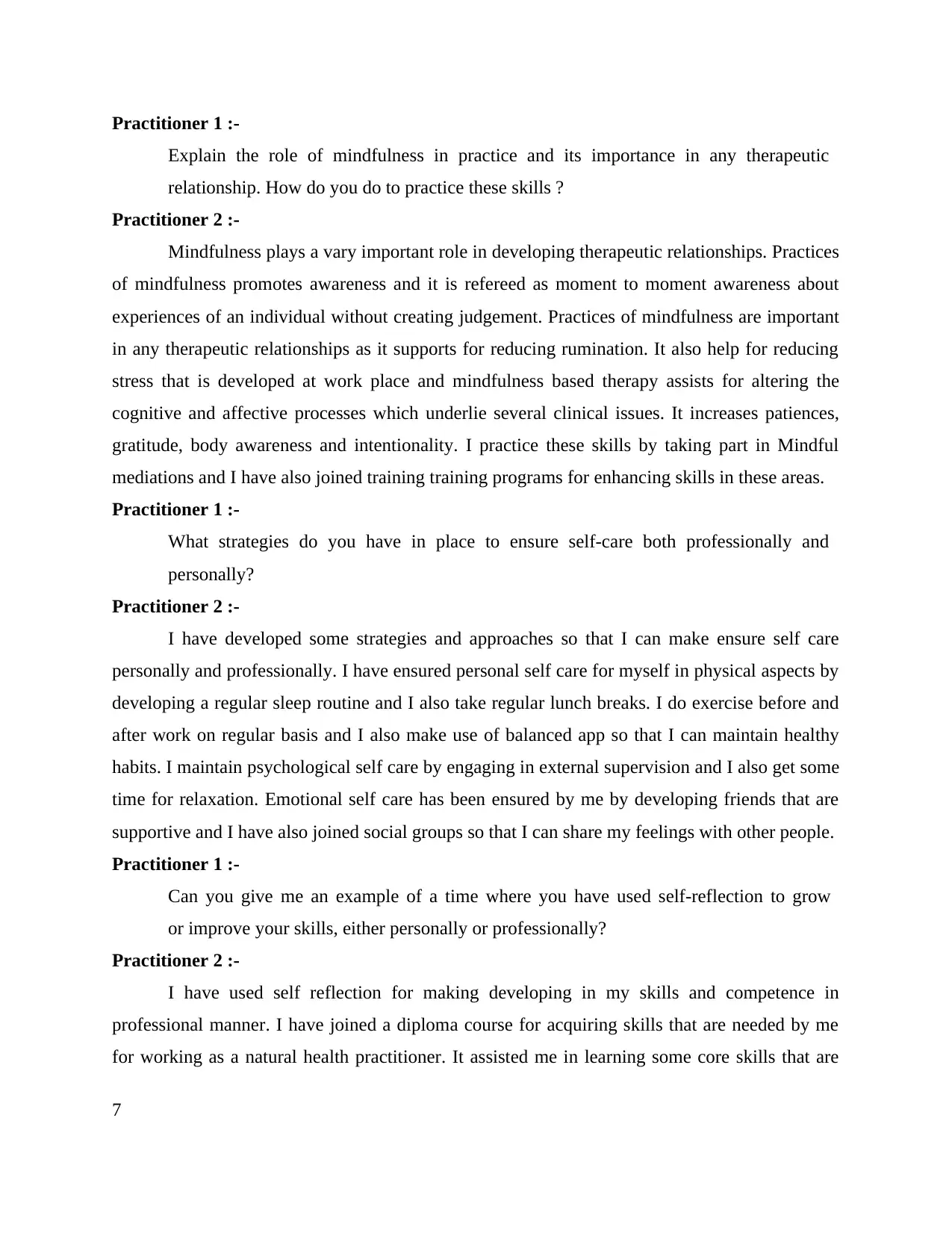
Practitioner 1 :-
Explain the role of mindfulness in practice and its importance in any therapeutic
relationship. How do you do to practice these skills ?
Practitioner 2 :-
Mindfulness plays a vary important role in developing therapeutic relationships. Practices
of mindfulness promotes awareness and it is refereed as moment to moment awareness about
experiences of an individual without creating judgement. Practices of mindfulness are important
in any therapeutic relationships as it supports for reducing rumination. It also help for reducing
stress that is developed at work place and mindfulness based therapy assists for altering the
cognitive and affective processes which underlie several clinical issues. It increases patiences,
gratitude, body awareness and intentionality. I practice these skills by taking part in Mindful
mediations and I have also joined training training programs for enhancing skills in these areas.
Practitioner 1 :-
What strategies do you have in place to ensure self-care both professionally and
personally?
Practitioner 2 :-
I have developed some strategies and approaches so that I can make ensure self care
personally and professionally. I have ensured personal self care for myself in physical aspects by
developing a regular sleep routine and I also take regular lunch breaks. I do exercise before and
after work on regular basis and I also make use of balanced app so that I can maintain healthy
habits. I maintain psychological self care by engaging in external supervision and I also get some
time for relaxation. Emotional self care has been ensured by me by developing friends that are
supportive and I have also joined social groups so that I can share my feelings with other people.
Practitioner 1 :-
Can you give me an example of a time where you have used self-reflection to grow
or improve your skills, either personally or professionally?
Practitioner 2 :-
I have used self reflection for making developing in my skills and competence in
professional manner. I have joined a diploma course for acquiring skills that are needed by me
for working as a natural health practitioner. It assisted me in learning some core skills that are
7
Explain the role of mindfulness in practice and its importance in any therapeutic
relationship. How do you do to practice these skills ?
Practitioner 2 :-
Mindfulness plays a vary important role in developing therapeutic relationships. Practices
of mindfulness promotes awareness and it is refereed as moment to moment awareness about
experiences of an individual without creating judgement. Practices of mindfulness are important
in any therapeutic relationships as it supports for reducing rumination. It also help for reducing
stress that is developed at work place and mindfulness based therapy assists for altering the
cognitive and affective processes which underlie several clinical issues. It increases patiences,
gratitude, body awareness and intentionality. I practice these skills by taking part in Mindful
mediations and I have also joined training training programs for enhancing skills in these areas.
Practitioner 1 :-
What strategies do you have in place to ensure self-care both professionally and
personally?
Practitioner 2 :-
I have developed some strategies and approaches so that I can make ensure self care
personally and professionally. I have ensured personal self care for myself in physical aspects by
developing a regular sleep routine and I also take regular lunch breaks. I do exercise before and
after work on regular basis and I also make use of balanced app so that I can maintain healthy
habits. I maintain psychological self care by engaging in external supervision and I also get some
time for relaxation. Emotional self care has been ensured by me by developing friends that are
supportive and I have also joined social groups so that I can share my feelings with other people.
Practitioner 1 :-
Can you give me an example of a time where you have used self-reflection to grow
or improve your skills, either personally or professionally?
Practitioner 2 :-
I have used self reflection for making developing in my skills and competence in
professional manner. I have joined a diploma course for acquiring skills that are needed by me
for working as a natural health practitioner. It assisted me in learning some core skills that are
7
Paraphrase This Document
Need a fresh take? Get an instant paraphrase of this document with our AI Paraphraser
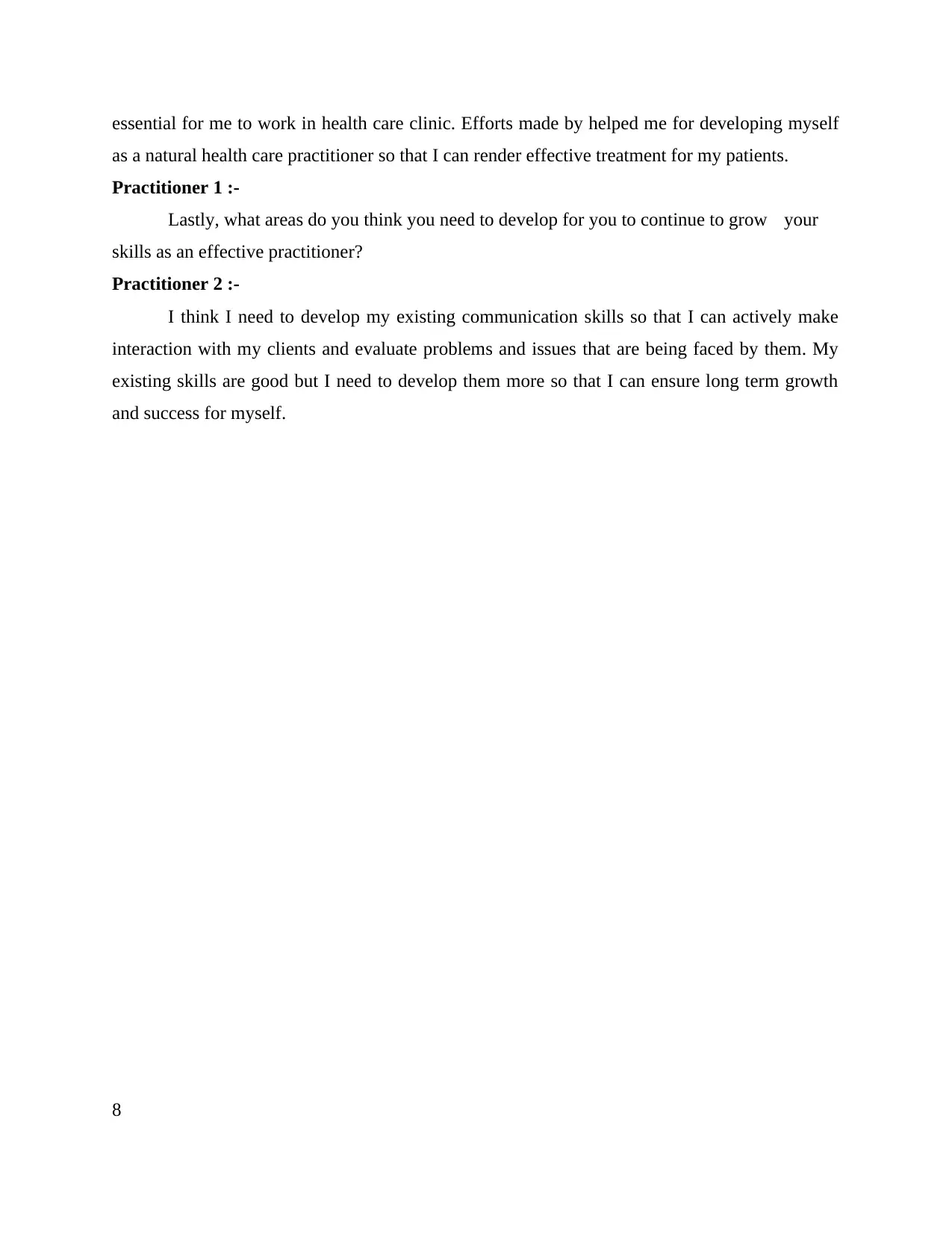
essential for me to work in health care clinic. Efforts made by helped me for developing myself
as a natural health care practitioner so that I can render effective treatment for my patients.
Practitioner 1 :-
Lastly, what areas do you think you need to develop for you to continue to grow your
skills as an effective practitioner?
Practitioner 2 :-
I think I need to develop my existing communication skills so that I can actively make
interaction with my clients and evaluate problems and issues that are being faced by them. My
existing skills are good but I need to develop them more so that I can ensure long term growth
and success for myself.
8
as a natural health care practitioner so that I can render effective treatment for my patients.
Practitioner 1 :-
Lastly, what areas do you think you need to develop for you to continue to grow your
skills as an effective practitioner?
Practitioner 2 :-
I think I need to develop my existing communication skills so that I can actively make
interaction with my clients and evaluate problems and issues that are being faced by them. My
existing skills are good but I need to develop them more so that I can ensure long term growth
and success for myself.
8
1 out of 8
Related Documents
Your All-in-One AI-Powered Toolkit for Academic Success.
+13062052269
info@desklib.com
Available 24*7 on WhatsApp / Email
![[object Object]](/_next/static/media/star-bottom.7253800d.svg)
Unlock your academic potential
Copyright © 2020–2026 A2Z Services. All Rights Reserved. Developed and managed by ZUCOL.


![Interview Report: Insights into a Psychology Career, [University Name]](/_next/image/?url=https%3A%2F%2Fdesklib.com%2Fmedia%2Fimages%2Fzr%2F69a9316b2c224c118408ed3eb4cfca70.jpg&w=256&q=75)


